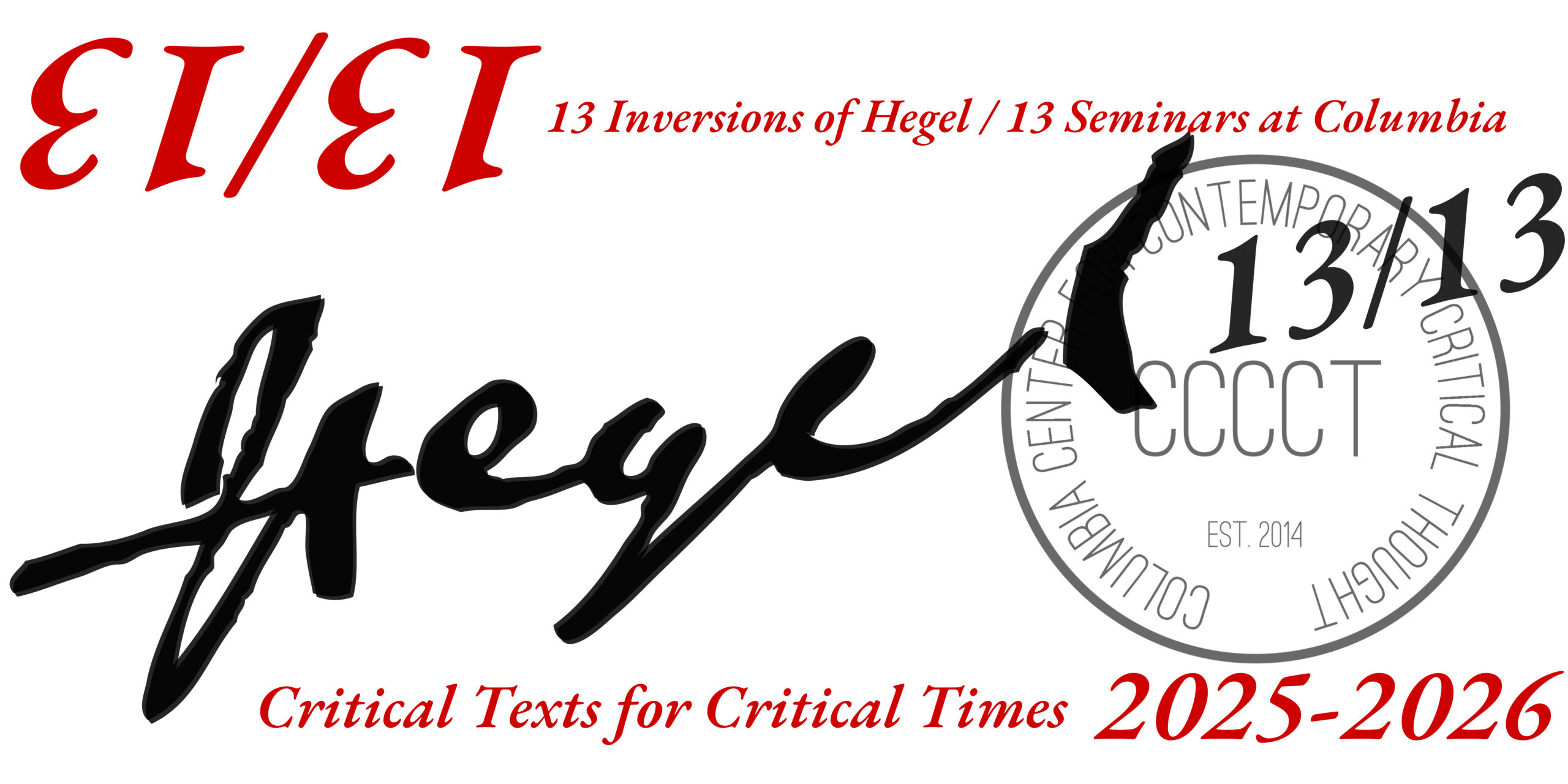To join Hegel 13/13 with Gayatri Spivak Chakravorty remotely, please go to this Zoom link.
You can join the livestream here:

Gayatri Chakravorty Spivak discusses Marx and Hegel
Wednesday, February 25, 2026, at 6:15PM in JGH 101 at Columbia Law School
RSVP here
Readings for the Spivak Seminar:
Karl Marx, The Eighteenth Brumaire of Louis Bonaparte (Die Revolution, 1852)
Karl Marx and Friedrich Engels, Karl Marx, Frederick Engels: Collected Works (Progress Publishers, 1975)
G.W.F. Hegel, Hegel’s Philosophy of Right, trans. T.M. Knox (Oxford: Clarendon Press, 1952)
Karl Marx, Capital: Volume 1: A Critique of Political Economy (Verlag von Otto Meissner, 1887)
G.W.F. Hegel, The Phenomenology of Spirit (Oxford University Press, 1977)
Karl Marx, Capital: Volume 3: A Critique of Political Economy (Verlag von Otto Meissner, 1887)
* * *
We are also preparing additional seminars on Marx and Hegel, including the following:
A Seminar on Marx’s 1843 Manuscripts on Hegel’s Philosophy of Right
In the Spring of 1843, Karl Marx begins work on a close exegetic study of Hegel’s Elements of the Philosophy of Law (1820), focusing on a portion of the subsection on “The State” (paragraphs 261-313).[i] He had nursed the idea for at while. In a letter to Arnold Ruge dated March 5, 1842, Marx had already expressed his desire to engage Hegels’ political philosophy, noting to Ruge: “Another article which I also intended for the Deutsche Jahrbücher is a criticism of Hegelian natural law, insofar as it concerns the internal political system. The central point is the struggle against constitutional monarchy as a hybrid which from beginning to end contradicts and abolishes itself. Res publica is quite untranslatable into German.”[ii] That is the work, with a slightly different emphasis, that Marx would conduct during the summer of 1843.
After completing the exegetic work on Hegel’s Philosophy of Right, Marx synthesized the resulting argument into an article, which he wrote during the period September 1843 to January 1844, and published in February 1844 under the title “A Contribution to the Critique of Hegel’s Philosophy of Right: Introduction” (Zur Kritik der Hegel’schen Rechts-Philosophie. Einleitung) in the Deutsch-französische Jahrbücher. Marx’s article on Hegel is a call to revolution in Germany. Marx calls for total human emancipation through the dissolution of society and the universalization of the working class. He advocates for the radical overthrow, by force, of the social conditions that oppress ordinary German people. This follows logically and necessarily, Marx argues, from an analysis and criticism of Hegel’s philosophy of law and of the state.
The 1843 Manuscripts have given rise to important debates over questions of democracy and republicanism, and over the place of revolution in progressive movements. Solange Mercier-Josa’s book, Entre Hegel et Marx, produced stimulating exchanges in France, and Geoff Mann’s recent book on Keynesianism in the U.S., among others. This segment will explore these and other questions surrounding Marx’s critique of Hegel’s Philosophy of Right, in an effort to determine what more we can glean for present political struggles.
Core Readings
Karl Marx, Critique of Hegel’s “Philosophy of Right,” ed. Joseph O’Malley (Cambridge: Cambridge University Press, 1970).
Karl Marx, “A Contribution to the Critique of Hegel’s Philosophy of Right: Introduction,” 129-142, in Karl Marx, Critique of Hegel’s “Philosophy of Right,” ed. Joseph O’Malley (Cambridge: Cambridge University Press, 1970), available online at https://www.marxists.org/archive/marx/works/1843/critique-hpr/intro.htm.
Geoff Mann, In the Long Run We Are All Dead: Keynesianism, Political Economy, and Revolution (New York: Verso, 2017).
Solange Mercier-Josa, Entre Hegel et Marx. Points cruciaux de la philosophie hégélienne du droit (Paris: L’Harmattan, 1999), available online at https://www.editions-harmattan.fr/catalogue/livre/entre-hegel-et-marx/65993.
Étienne Balibar and Gérard Raulet, eds., Marx démocrate: le manuscrit de 1843(Paris: Presses universitaires de France, 2001), available at https://www.puf.com/marx-democrate-le-manuscrit-de-1843?v=19481.
Additional Readings
Miguel Abensour, La démocratie contre l’État. Marx et le moment machiavélien(Paris: Éditions du félin, 2012)
Norberto Bobbio, Studi hegeliani. Diritto, società civile, stato (Einaudi, 1997); Norberto Bobbio, “Gramsci and the conception of civil society,” in Gramsci and Marxist Theory, ed. Chantal Mouffe (London: Routledge and Kegan Paul, 1979)
Richard Bourke, Hegel’s World Revolutions (Princeton, NJ: Princeton University Press, 2023)
Jean Hyppolite, “La conception hégélienne de L’État et sa critique par Karl Marx,” Cahiers Internationaux de Sociologie, Nouvelle Série, Vol. 101 (1966 [1947]), 267-284
Domenico Losurdo, Hegel and the Freedom of Moderns, trans. Jon Morris and Marella Morris (Durham, NC: Duke University Press)
Solange Mercier-Josa, Pour lire Hegel et Marx (Paris: Éditions sociales, 1980).
Jacob Rogozinski, “À double tour (introduction à l’onto-logique de Marx),” in Le retrait du politique (Paris: Galilée, 1983)
Frank Ruda, Hegel’s Rabble: An Investigation into Hegel’s Philosophy of Right(Continuum, 2011)
Additional Resources
Jean-Christophe Angaut, Bakounine jeune hégélien. La philosophie et son dehors(Paris: ENS Éditions, 2007)
Étienne Balibar, The Philosophy of Marx (New and Updated Edition), trans. Chris Turner and Gregory Elliott (London: Verso, 2017)
Les Jeunes hégéliens. Politique, religion, philosophie. Une anthologie. Ed. Franck Fischbach (Paris: Gallimard, 2022)
David McLellan, The Young Hegelians and Karl Marx (New York: Frederick A. Praeger, 1969).
Notes
[i] Karl Marx, “A Contribution to the Critique of Hegel’s Philosophy of Right: Introduction,” 129-142, in Karl Marx, Critique of Hegel’s “Philosophy of Right,” ed. Joseph O’Malley (Cambridge: Cambridge University Press, 1970).
[ii] Karl Marx, “To Arnold Ruge in Dresden,” letter dated March 5, 1842, pp. 382-283, in Karl Marx-Frederick Engels, Collected Works, Volume 1 (Karl Marx: 1835-1843) (New York: International Publishers, 1975), at 382-383.
* * *
A Seminar on Marx’s 1844 Paris Manuscripts and Hegel’s Phenomenology of Spirit
In the Paris manuscripts of 1844, Karl Marx pens a section titled the “Critique of the Hegelian Dialectic and Philosophy as a Whole.” Marx accuses Hegel of having wrongly posited self-consciousness as the essence of human beings and thus having misconstrued the motion of history. As he writes, “For Hegel the essence of man—man—equals self-consciousness. All estrangement of the human essence is therefore nothing but estrangement of self-consciousness.”[i] According to Marx, estrangement is misdiagnosed by Hegel and must be set back straight by locating the true essence of man in what Marx calls “species being.”[ii]
The Paris Manuscripts have generated a wide-ranging debate over the concept of human self-alienation. In this segment, we will explore Marx’s critique of Hegel’s Phenomenology of Spirit as an exemplar of the political productivity of inversion.
Core Readings
G.W.F. Hegel, Phenomenology of Spirit, trans. A.V. Miller (Oxford: Oxford University Press, 1977); trans. George di Giovanni (Cambridge: Cambridge University Press, 2010) (Cambridge Hegel Translations)
Karl Marx, “Critique of the Hegelian Dialectic and Philosophy as a Whole,” in Karl Marx, Economic and Philosophical Manuscripts of 1844 in Karl Marx-Frederick Engels, Collected Works, Volume 3 (Marx and Engels 1843-1844), trans. Martin Milligan (New York: International Publishers, 1975), available on-line at https://archive.org/details/economicphilosophicmanuscripts1844/page/n1/mode/2up
Martin Hägglund, This Life: Secular Faith and Spiritual Freedom (New York: Pantheon Books 2019)
Rahel Jaeggi, Alienation, trans. Frederick Neuhouser and Alan E. Smith, ed. Frederick Neuhouser (New York: Columbia University Press, 2014).
Additional Readings
Ernst Bloch, The Principle of Hope, Volume 1, trans. Neville Plaice, Stephen Plaice and Paul Knight (Oxford: Basil Blackwell, 1986 [1959]), discussion around p. 251.
Bruno Bosteels, chapter 1 of The State and Insurrection: New Interventions in Latin American Marxist Theory (forthcoming).
Jean Hyppolite, Genèse et structure de la Phénoménologie de l’esprit de Hegel, ed. Giuseppe Bianco (Paris: Classigues Garnier, 2022 [1947]); Jean Hyppolite, Genesis and Structure of Hegel’s Phenomenology of Spirit, trans. Samuel Cherniak and John Heckman (Evanston, IL: Northwestern University Press, 1974).
Jean Hyppolite, Études sur Marx et Hegel (Paris: Marcel Rivière et Cie, 2eme edition, 1965).
Georg Lukács, The Young Hegel: Studies in the Relations between Dialectics and Economics, trans. R. Livingstone (Cambridge: MIT Press, 1976)
Hartmut Rosa, Alienation and Acceleration: Towards a Critical Theory of Late-Modern Temporality (Polity Press, 2010).
Notes
[i] Marx, “Critique of the Hegelian Dialectic and Philosophy as a Whole,” in Paris Manuscripts, Tucker at 113.
[ii] Marx, “Critique of the Hegelian Dialectic and Philosophy as a Whole,” in Paris Manuscripts, Tucker at 116 (“But man is not merely a natural being: he is a humannatural being. That is to say, he is a being for himself. Therefore he is a species being, and has to confirm and manifest himself as such both in his being and in his knowing.”).
* * *
A Seminar on Marx’s Grundrisse (1857) & Capital (1867), and Hegel’s Logic
Published in 1988, Hiroshi Uchida’s detailed short compendium, Marx’s Grundrisse and Hegel’s Logic, serves as both a capstone to a larger body of research and a starting point to reexamine the way that Marx drew on Hegel’s Science of Logic to develop his mature political economic thought, first in the Grundrisse in 1857-59 and then in Volume 1 of Capital published in 1867.
“As far as the method [of the Grundrisse] goes,” Marx wrote to Engels on January 14, 1858, “the fact of having leafed through, once again, by mere accident, Hegel’s Logic rendered me a great service.”[i] In his letter to Engels, Marx goes on to write that “If I ever find the time for a work of this type, I would greatly desire to make accessible to the intellect of the common man … how much there is in Hegel’s method of rationality and mystification.”[ii] According to Toni Negri, this reflects Marx’s methodological synthesis of critique and praxis, or what Negri calls his “spirit of theoretico-practical synthesis.”[iii]
Readers of the Grundrisse have been scouring for the traces of the Logic ever since—traces that Marx himself left like crumbs on a path. In his discussion of market value in the “Chapter on Money,” for instance, Marx explains that the “market value” of a commodity is never equated with its “real value as if the latter were a third party, but rather by means of constant non-equation of itself” and he then adds, in parenthesis, “as Hegel would say, not by way of abstract identity, but by constant negation of the negation, i.e. of itself as negation of real value.”[iv]
In this segment, we will explore the relationship between Marx’s mature political economic writings and his reading of Hegel’s Science of Logic.
Core Readings
Karl Marx, Excerpts from The Eighteenth Brumaire of Louis Bonaparte (Die Revolution, 1852)
G.W.F. Hegel, Science of Logic, trans. George Di Giovanni (Cambridge: Cambridge University Press, 2015).
G.W.F. Hegel, Hegel’s Logic, Being Part One of the Encyclopedia of the Philosophical Sciences (1830), trans. William Wallace (Oxford: Oxford University Press, 1975) . Available at https://www.marxists.org/reference/archive/hegel/works/sl/slconten.htm.
Karl Marx, Grundrisse: Foundations of the Critique of Political Economy, trans. Martin Nicolaus (New York: Vintage Books, 1973).
Karl Marx, Capital, Vol. 1, trans. Ben Fowkes (New York: Penguin Classics, 1992).
Ruy Fausto, Le capital et la logique de Hegel. Dialectique marxienne, dialectique hégélienne (Paris: L’Harmattan, 1997)
Hiroshi Uchida, Marx’s Grundrisse and Hegel’s Logic, ed. Terrell Carver (Routledge, 1988).
Roman Rosdolsky, The Making of Marx’s Capital (London: Pluto Press, 1992).
Additional readings
Riccardo Bellofiore, Guido Starosta, and Peter D. Thomas, eds., In Marx’s Laboratory: Critical Interpretations of the Grundrisse (Historical Materialism Book Series, Volume 48) (Leiden: Brill, 2013)
Ruy Fausto, Sur le concept de capital. Idée d’une logique dialectique (Paris: L’Harmattan, 1985)
David Harvey, A Companion to Marx’s Grundrisse (New York: Verso, 2023)
Marcello Musto, ed., Karl Marx’s Grundrisse: Foundations of the Critique of Political Economy 150 Years Later (New York: Routledge, 2008)
Antonio Negri, Marx Beyond Marx: Lessons on the Grundrisse (London: Pluto Press, 1978)
Moishe Postone, Time, Labor and Social Domination: A Reinterpretation of Marx’s Critical Theory (Cambridge: Cambridge University Press, 1996)
Notes
[i] Quoted in Antonio Negri, Marx Beyond Marx: Lessons on the Grundrisse (London: Pluto Press, 1978), at p. 2.
[ii] Quoted in Negri, Marx Beyond Marx, at p. 2-3.
[iii] Negri, Marx Beyond Marx, at p. 3.
[iv] Karl Marx, Grundrisse: Foundations of the Critique of Political Economy, trans. Martin Nicolaus (New York: Vintage Books, 1973), p. 137 (referring to Hegel, Science of Logic, trans. A. V. Miller (London: Allen & Unwin, 1969), p. 416).
